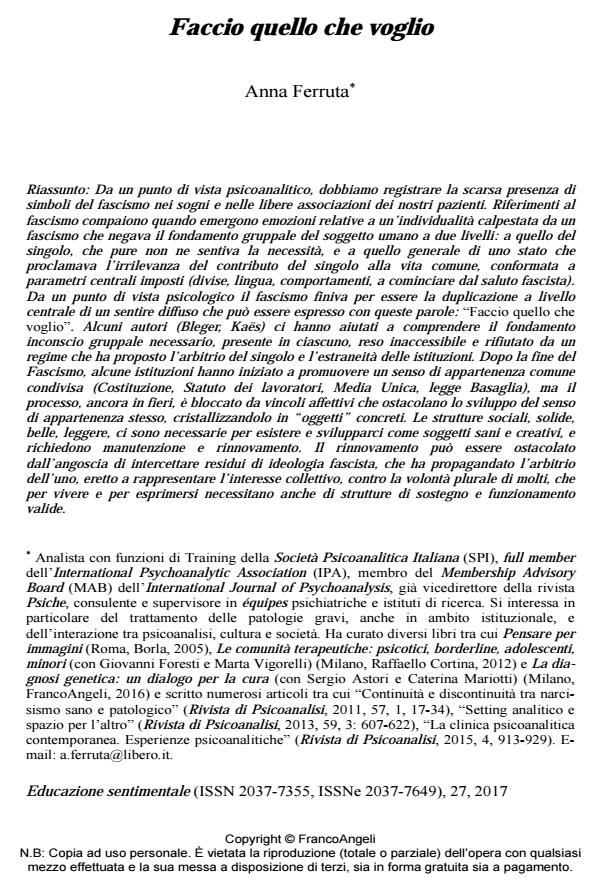Faccio quello che voglio
Journal title EDUCAZIONE SENTIMENTALE
Author/s Anna Ferruta
Publishing Year 2017 Issue 2017/27
Language Italian Pages 9 P. 103-111 File size 165 KB
DOI 10.3280/EDS2017-027007
DOI is like a bar code for intellectual property: to have more infomation
click here
Below, you can see the article first page
If you want to buy this article in PDF format, you can do it, following the instructions to buy download credits

FrancoAngeli is member of Publishers International Linking Association, Inc (PILA), a not-for-profit association which run the CrossRef service enabling links to and from online scholarly content.
I do what I want. From a psycho-analytical point of view, we must note the low proportion of fascist symbols in our patients’ dreams and loose associations. References to Fascism appear associated to emotions dealing with an individuality trampled by a Fascism that denied the group basis of the human subject both at a individual level (not feeling the necessity of it), and at a general level (a government proclaiming the irrelevance of individuals’ contribution to the common life, complied to imposed standards such as uniforms, language, behaviours, in particular the Fascist salute). From a psychological point of view, Fascism ended up being the central duplication of a common wisdom that could be expressed into these words: "I do what I want". Some authors (Bleger, Kaës) helped us understand the unconscious group basis, embodied in every person, rendered inaccessible and denied by a system based on the individual’s arbitrariness and strangeness of institutions. After the end of Fascism, some institutions began to encourage an agreed sense of belonging (Republican Constitution, Workers’ Statute, Single High School, "Basaglia Act"), but the process, still in progress, is hampered by affective constraints limiting the development of the sense of belonging itself, crystallised in concrete "objects". For being and developing ourselves as healthy and creative subjects, we need solid, nice, light social structures that ask maintenance and renewal. Renewal can be hindered by the anxiety of intercepting traces of fascist ideology, that propagated the individual’s arbitrariness, set up as collective interest, against the plural will of the many who, for living and expressing themselves need effective and well-functioning support structures.
Keywords: Unconscious groupality, institutions, inter-subjectivity, singular and plural identity, Fascism.
Anna Ferruta, Faccio quello che voglio in "EDUCAZIONE SENTIMENTALE" 27/2017, pp 103-111, DOI: 10.3280/EDS2017-027007